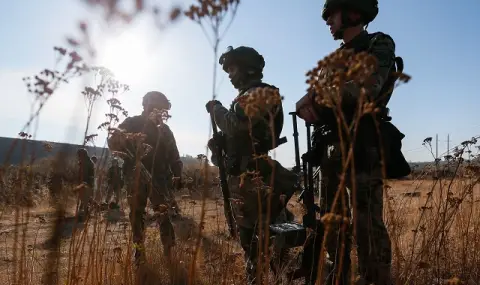Ukrainian President Volodymyr Zelensky said on December 14 that the Russian military has deployed North Korean soldiers in infantry attacks in the Kursk region. They have already suffered "significant" losses. They are deployed only for offensive operations, but may be used in other unspecified areas of the front line in the future.
This is according to another analysis of the fighting in Ukraine by the Institute for the Study of War (ISW).
This is the first time a Ukrainian official has reported it since Defense Minister Rustem Umerov announced it in an interview with South Korean national television KBS on November 5.
Russian bloggers recently acknowledged that North Korean forces are involved in attacks in the Kursk region and stated on December 12 and 13 that North Korean soldiers took part in the capture of Plekhovo (south of Sudzha) on December 6.
Several Russian bloggers claim that North Korean special forces captured Plekhovo without the help of Russian forces, but one blogger characterized the attack as a joint Russian-North Korean operation.
Geo-tracked footage released on December 14 shows approximately 40 infantrymen conducting an attack east of Kremyanoe (east of Korenevo), and some sources claim that it shows North Korean troops, although ISW cannot independently verify.
The Ukrainian military newspaper Militaryni reported on December 14, citing several Ukrainian sources, that North Korean soldiers had carried out infantry attacks in open terrain in groups of 20 to 30 personnel in unspecified areas in the Kursk region.
However, ISW cannot independently verify any of these claims. He previously noted that North Korea's ability to learn and integrate lessons from fighting alongside Russia would likely be significantly impaired if the Russian military command used troops in highly attritional, infantry-led attacks.
The prospects for Russia's continued military presence in Syria remain unclear as reports that Russia is evacuating its military assets continue. Ukraine's Main Directorate of Military Intelligence (GUR) said on December 14 that "hundreds" of Russian soldiers were unable to reach the Khmeimim air base from Homs province for fear of being shelled. The GUR said the Russian Defense Ministry's (MO) Africa Corps had arrived in Syria to protect Russian forces advancing toward Russian bases on the west coast. Russian Colonel Dmitry Motrenko is negotiating with military contingents in Syria from other unspecified countries to secure guarantees of "immunity" about Russian soldiers waiting at Tiyas air base west of Palmyra.
About 1,000 Russian troops left Damascus on December 13 in a column heading for the port of Tartus and the "Hmeimim" air base. ISW saw footage on December 13 of Russian military convoys moving from Damascus and other areas in southern Syria, likely to the two main Russian bases.
"Reuters" reported on December 14 that a "Syrian security official" stationed near the "Hmeimim" air base said that at least one cargo plane had taken off from the base on December 14, bound for Libya.
The complex nature of the Syrian interim government is likely to lead to conflicting reports about whether Russia is engaged in talks with Syrian opposition groups. Hayat Tahrir al-Sham (HTS) controls the Syrian interim government, but HTS and the interim government do not yet have full control over the disparate groups that helped topple the Assad regime. Russian Deputy Foreign Minister Mikhail Bogdanov said on December 12 that Russia had established contacts with HTS.
Reuters reported on December 14 that a Russian source said discussions between Russia and the Syrian interim government were continuing.
A "senior rebel official close to the new interim administration," however, told Reuters that the issue of Russia's military presence in Syria and Russia's previous agreements with the Assad regime "is not under discussion" and that talks would address the issue at an unspecified future time. The official reportedly said that "the Syrian people will have the final say".
The Kremlin news channel TASS reported on December 13 that Mohammed Sabra, a Syrian politician who represented the Syrian opposition's High Negotiations Committee at the 2016 Geneva peace talks on the Syrian civil war, had similarly said that there should be a referendum in the future that would allow the Syrian people to approve any foreign military presence in Syria.
Ukrainian forces struck an oil depot in the Oryol region on the night of December 13-14. The Ukrainian General Staff reported that units of the Ukrainian Special Operations Forces and the Ukrainian Armed Forces struck the "Steel Horse" oil depot near the city of Oryol, causing a fire at the facility.
The Ukrainian General Staff reported that the oil depot supplies products to the Russian army and noted that Ukrainian forces were still assessing the damage from the battle. Footage released on December 13 and 14 shows the aftermath of the strike and the fire at the facility, and Russian officials acknowledged the strike and the resulting fire.
The new, Georgian Dream-dominated parliament and other state bodies elected Mikheil Kavelashvili as President of Georgia on December 14.
Kavelashvili received the votes from members of parliament and other government bodies needed to cover the two-thirds threshold to become president, despite the fact that opposition members of parliament boycotted the vote.
President Salome Zurabishvili continues to challenge the legitimacy of the Georgian Dream party's parliamentary election victory and stated that "nobody elected anyone" in response to Kavelashvili's election.
